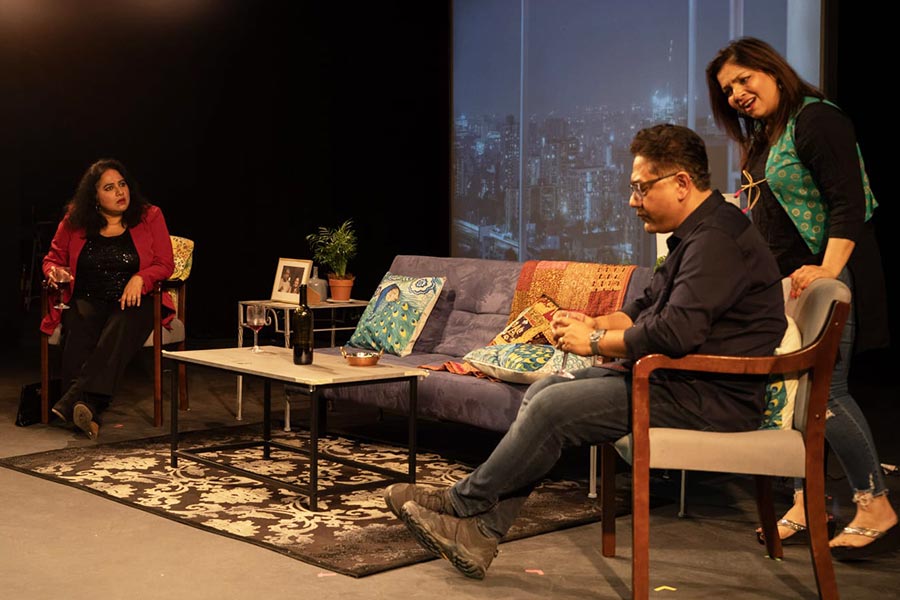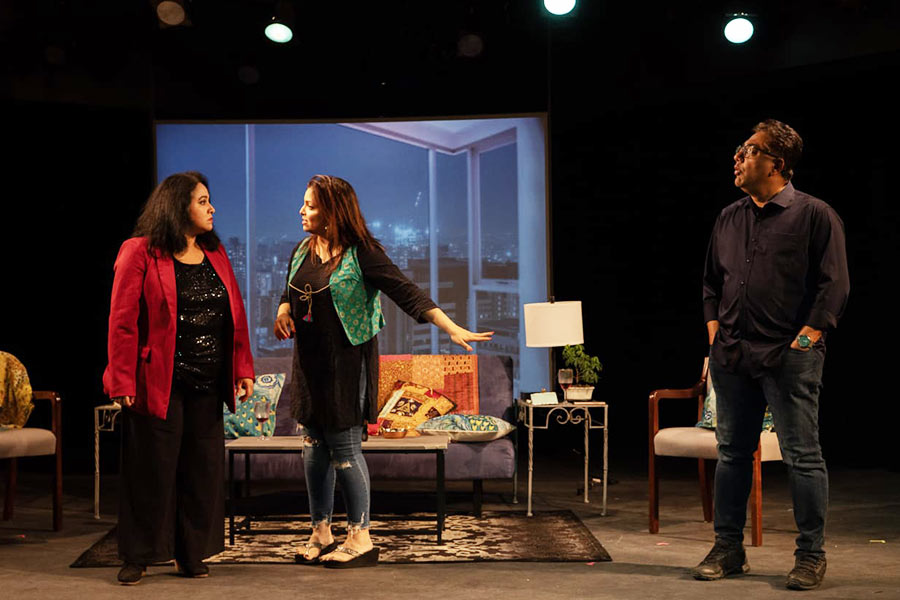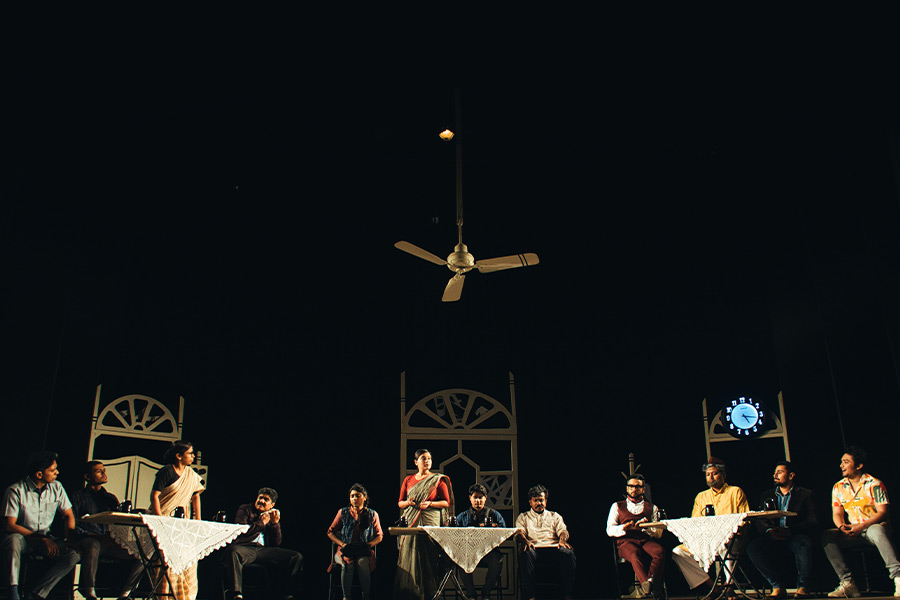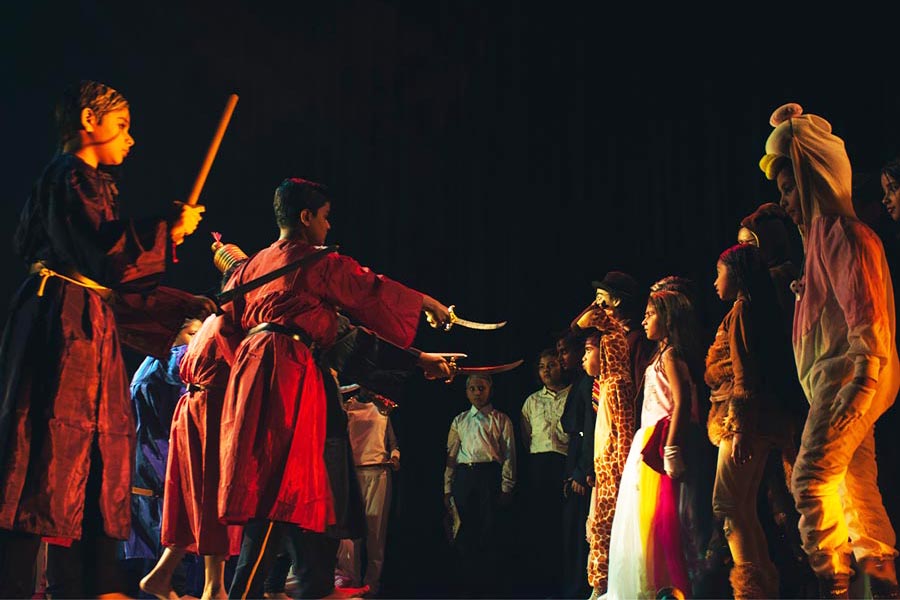What happens when an old flame lands up in the middle of a marriage? How does a man’s life get affected when his former girlfriend meets his wife?
That is the premise of Five Grains of Rice, performed at the Academy of Fine Arts on January 19. Written, designed and directed by Arindam Ghosh, who also plays the male lead, the play witnessed its 20th overall performance in Kolkata, having already been staged extensively across the US and awarded for its excellence by the Maryland Community Theater Festival Association and the Silver Spring One-Act Festival, among others. Accompanying Ghosh (as Jayant) on stage were Shampa Basu (as Ela) and Aditi Bhattacharya (as Damini), all of whom are settled in the US, where they are part of a local theatre group called Ebong Theatrix, based in Washington.
Five Grains of Rice was performed as part of an initiative by Shyambazar Mukhomukhi on the occasion of Soumitra Chatterjee’s birth anniversary. At the heart of the play are the emotional complexities characterising intimate interpersonal relationships, which come to the surface when a husband’s former girlfriend from his college days connects with his wife in Delhi one evening. What follows is tension, precarity and a potentially life-changing offer. Additionally, to make matters more intriguing, Damini, Jayant’s ex-girlfriend, seems to know things about him that he has been reluctant to share with Ela, his wife.
A Brahmanical lens and the crushing of the male ego

(L-R): Aditi Bhattacharya, Arindam Ghosh and Shampa Basu
The “germ of the idea”, as Ghosh suggests, came from fellow actor Basu five years ago, which was later taken forward and developed into a full-fledged play by Ghosh. The play was set to go on stage in early 2020, but the pandemic delayed its first performance, which took place in 2022. Five Grains came to Kolkata with a sterling reputation, which made it “daunting” for the cast. For instance, DC Theater Arts (a comprehensive platform for all things theatre in the District of Columbia in the US) had remarked the following about the play: “This is a fascinating study of human nature and self-deception, expertly expressed by the actors and directed by Ghosh, who also wrote and performed in this tour de force offering.”
Two themes become significant during the course of this play. They are the Brahmanical approach towards professions and the crushing of the male ego. About the second theme, Ghosh said: “I wanted to see things from a female perspective, which led to the motivation behind the play and the setup.” Upon asking why Ghosh feels there has been a Brahmanical approach towards different professional fields, he said: “Because there’s a hierarchy in our society, a sense that some occupations are higher than others, some occupations are better than others. In some occupations, you’re considered to be of higher intellect while in others you’re not.” The play deals with a myriad of occupational issues that are weaved into lengthy discussions, with a satirical touch preventing things from getting too heavy.
‘I wanted to challenge this attitude… where a woman is expected to sacrifice her career and dreams’

Filmmaker Suman Mukhopadhyay played an important role in bringing the play to Kolkata
Another distinguishing feature of the play is the bond between the two female characters and how it ultimately affects the male ego. Despite the identity of the women revolving around the man, their relationship is portrayed with refreshing grace, almost as if they were part of some feminist utopia. Ghosh credits his wife, friends and female co-stars for relentlessly brainstorming ideas with him and helping him visualise things from the female point of view. “I wanted to challenge this attitude, especially among South Asians, where a woman is expected to sacrifice her career and dreams even as their male counterpart moves forward,” reflected Ghosh.
To conclude, Ghosh expressed his gratitude towards filmmaker Suman Mukhopadhyay for encouraging them to stage the play in Kolkata. Ghosh and Basu had performed other plays with Nandikar several years ago at the Academy of Fine Arts, albeit in Bengali. For Aditi Bhattacharya, this marked her first time performing at the Academy. “Suman Mukhopadhyay was visiting (in the US) when he saw our play and loved it. He asked us to bring it to Kolkata and helped us put it together,” said the cast, who also performed the play in other locations across West Bengal till January 25.


